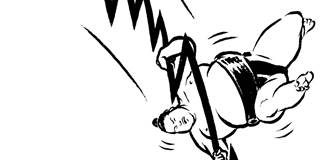Allegations of match-fixing, dope-smoking, orgies, and ties to gangsters among the sport’s top stars have enraged the Japanese public and mobilized the police. But Sumo's alleged ties with the Yakuza, Japan's ancient organized-crime groups, partly reflect the country's economic malaise, which has cost the sport its more respectable patrons.
OSAKA – Perhaps no other sport is pursued as religiously as sumo wrestling. Before a match, referees (who double as Shinto priests) purify the seaweed, salt, and sake. Wrestlers wash their faces, mouths, and armpits before entering the dohyo (ring), on whose sacred sand neither shoes nor women may tread. Before a match starts, the two contestants raise their hands to show that they are not hiding weapons in the folds of their loincloth-like belt.
The elders of the Japan Sumo Association (JSA), the retired wrestlers who govern the sport, see themselves less as administrators than as guardians of a holy tradition. They promote wrestlers to the highest ranks not just on brute merit, but according to how much hinkaku (dignity) they are judged to possess.
That dignity is vanishing. Allegations of match-fixing, dope-smoking, orgies, and ties to gangsters among the sport’s top stars have enraged the Japanese public. Indeed, Japanese Sumo circles are now facing growing public infamy, causing many Japanese to wonder if the country, after 20 years of stagnation, is capable of purifying itself.



OSAKA – Perhaps no other sport is pursued as religiously as sumo wrestling. Before a match, referees (who double as Shinto priests) purify the seaweed, salt, and sake. Wrestlers wash their faces, mouths, and armpits before entering the dohyo (ring), on whose sacred sand neither shoes nor women may tread. Before a match starts, the two contestants raise their hands to show that they are not hiding weapons in the folds of their loincloth-like belt.
The elders of the Japan Sumo Association (JSA), the retired wrestlers who govern the sport, see themselves less as administrators than as guardians of a holy tradition. They promote wrestlers to the highest ranks not just on brute merit, but according to how much hinkaku (dignity) they are judged to possess.
That dignity is vanishing. Allegations of match-fixing, dope-smoking, orgies, and ties to gangsters among the sport’s top stars have enraged the Japanese public. Indeed, Japanese Sumo circles are now facing growing public infamy, causing many Japanese to wonder if the country, after 20 years of stagnation, is capable of purifying itself.